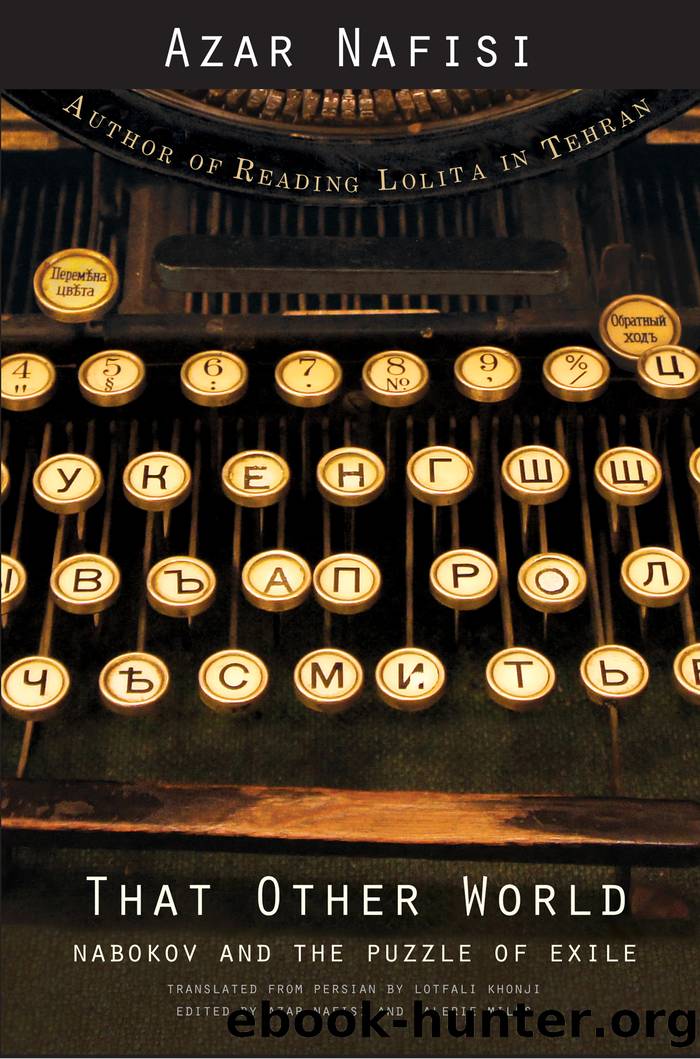That Other World by Azar Nafisi

Author:Azar Nafisi
Language: eng
Format: epub
Publisher: Yale University Press
Published: 2019-08-14T16:00:00+00:00
8
I have elaborated on Pninâs magical world. But what about Pnin himself? It is generally assumed (or it might reasonably be assumed) that a character who is able to find her way into a magical world is entirely different from the rest of us. Alice, for example, has curiosity, courage, and, consequently, a personality beyond that of ordinary girls. Another example is Cinderella, a character who recalls Pnin. Looking from a different angle, we can say that a person who manages to find a way into a magical realm must remain connected to and dependent on the everyday world at the same time. In practice, such characters are the only ones capable of finding a magic wand because it would be impossible for them to live without it. So besides the question of the uniqueness of Pninâs personality, there is another question to consider: how does a magic wand come to Pninâs rescue? It is particularly relevant in Pnin because the narrator openly admits that he hates happy endings; unlike the narrators of Invitation to a Beheading and Bend Sinister, he says that he has no intention of answering any cry for help or intervening in the denouement.
Again, we find the narrator, a suspicious persona at best, combining aspects of both angel and enchanter. He acts against the protagonist and at the same time serves as his protector. We have to accompany this persona in order to enjoy the novel, and we have to oppose him in order to properly appreciate Pninâs character. The narrator thus becomes a foil, created to give clarity to the protagonistâs personality. Pnin is the most magical element in the novel; what Nabokov wrote about Quixote applies to Pnin too. The whole novel revolves around Pninâs personality, and all other characters are colorless by comparison. It is only in their dealings with Pnin that they gain hue and relevance; it is Pninâs imagination, like Quixoteâs, and his prism of dreams, that saves the other characters from the banality of everyday life. The imagined, artificial dreamscapes of Pnin and Quixote are signs of the power and charm of imagination. The secondary characters are not depicted as complex or multidimensional, functioning only in an adjunct capacity to Pninâs personality. Many of Nabokovâs novels are structured as explorations of how the pendulum veers from reality to dreams, from life to death, from the present to the past, or vice versa. Pnin is built on this foundation. Pnin charms and fascinates the reader in the same way that Pnin fascinates his students. According to the narrator, Pnin is beloved by his students ânot for any essential ability but for those unforgettable digressions of his, when he would remove his glasses to beam at the past while massaging the lenses of the present.â90
In a brilliant chapter of his book on Nabokov, Americaâs Russian Novelist, G. M. Hyde, when dealing with Pnin, recalls the tradition of skaz. The word, a cognate of skazka (which means a popular or vulgar story in
Download
This site does not store any files on its server. We only index and link to content provided by other sites. Please contact the content providers to delete copyright contents if any and email us, we'll remove relevant links or contents immediately.
| Booksellers & Bookselling | General |
| History of Books |
4 3 2 1: A Novel by Paul Auster(12360)
The handmaid's tale by Margaret Atwood(7740)
Giovanni's Room by James Baldwin(7309)
Asking the Right Questions: A Guide to Critical Thinking by M. Neil Browne & Stuart M. Keeley(5745)
Big Magic: Creative Living Beyond Fear by Elizabeth Gilbert(5733)
Ego Is the Enemy by Ryan Holiday(5400)
The Body: A Guide for Occupants by Bill Bryson(5067)
On Writing A Memoir of the Craft by Stephen King(4924)
Ken Follett - World without end by Ken Follett(4712)
Adulting by Kelly Williams Brown(4558)
Bluets by Maggie Nelson(4541)
Eat That Frog! by Brian Tracy(4507)
Guilty Pleasures by Laurell K Hamilton(4430)
The Poetry of Pablo Neruda by Pablo Neruda(4084)
Alive: The Story of the Andes Survivors by Piers Paul Read(4013)
White Noise - A Novel by Don DeLillo(3998)
Fingerprints of the Gods by Graham Hancock(3982)
The Book of Joy by Dalai Lama(3965)
The Bookshop by Penelope Fitzgerald(3834)
